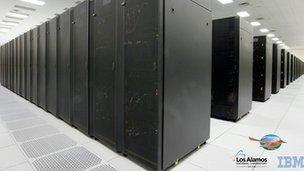'Petaflop' supercomputer is decommissioned
- Published

Roadrunner was housed in 288 fridge-sized cases
A US supercomputer called Roadrunner has been switched off by the Los Alamos National Laboratory in New Mexico.
The machine was the first to operate at "petaflop pace" - the equivalent of 1,000 trillion calculations per second - when it launched in 2008.
It has been used to model viruses and distant parts of the universe, as well as in nuclear weapons research.
It remains one of the fastest supercomputers in the world, but has been replaced by something even faster.
"Roadrunner got everyone thinking in new ways about how to build and use a supercomputer,'' said Gary Grider, from the Los Alamos National Laboratory high performance computing division, in a statement.
"Specialised processors are being included in new ways on new systems and being used in novel ways. Our demonstration with Roadrunner caused everyone to pay attention.''
Its replacement, the Cielo, has been used by the weapons research lab since 2010. While Roadrunner cost $121m (£79m) to develop, Cielo cost $54m (£35m) and is a faster operator, according to the lab.
Roadrunner was developed by computer giant IBM.
The huge machine includes 12,000 modified versions of the processor originally designed for the Sony Playstation 3, and 92km (57 miles) of fibre optic cable, housed in 288 refrigerator-sized cases.
It was shut down on Sunday 31 March and will be dismantled this month after some experiments are carried out on its operating system, said the laboratory.
"Even in death, we are trying to learn from Roadrunner," said Mr Grider.